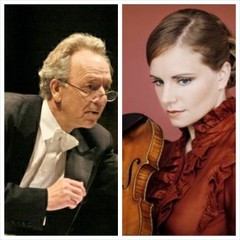|
Back
Great Music from Peter The Great's Town New York
Isaac Stern Auditorium, Carnegie Hall
02/15/2014 -
Sergei Prokofiev: Violin Concerto No. 2 in G Minor, Opus 63
Sergei Rachmaninoff: Symphony No. 2 in E Minor, Opus 27
Julia Fischer (Violin)
St. Petersburg Philharmonic Orchestra, Yuri Temirkanov (Artistic Director/Principal Conductor)

Y. Temirkanov, J. Fischer
(© Courtesy of the Artist, Decca/Felix Broede)
That “Sold Out” sign for the St. Petersburg Philharmonic Orchestra last night was sadly in error. Some ticket-holders, unaware that Manhattan possesses subways, taxis, buses, sidewalks and parking spaces, stayed away, leaving chasms of empty seats downstairs. (To be eagerly and rightly seized by the balcony-folk after the intermission.)
The St. Petersburg Philharmonic Orchestra members, though, must have been jubilant over a snowstorm celebrating each of their two concerts. Manhattan couldn’t provide troikas or birch tree fires, perhaps, but our snow is probably caviar to these visitors. (Or perhaps for Russian musicians, it’s the other way around.
Add to this their conductor, Yuri Temirkanov, who made his first appearance on the St. Petersburg dais 46 years ago, and has been their Artistic Director and Principal Conductor almost a quarter of a century. The Maestro needed no baton for his two works last night. The slightest bend of his fingers, the most minute gesture of his hand, and the large orchestra responded with alacrity.
Granted, neither orchestra nor conductor is as widely-known as the omnipresent Mr. Gergiev or his Mariinsky Orchestra. But the St. Petersburg (a.k.a. Leningrad) is older by far, and Mr. Temirkanof has made his reputation not as an international conductor but as the Russian conductor par excellence.
Which meant an orchestra whose brasses growled, whose magnificent strings played as hard as possible on their instruments, whose winds (especially the clarinet solo in the Rachmaninoff Symphony were more plangent than pretty. Not that the music wasn’t beautiful. But the colors were less glittering than earthy, aggressive. In even melodious passages of the Prokofiev Second Violin Concerto, one heard some brazen suspicions from the orchestra. In the Rachmaninoff Second Symphony, Mr. Temirkanov held back the orchestra a fraction, as if to say that nothing should be as luscious as the composer’s notes: there’s always a Dies Irae tucked beneath the melodies.
I take that back. Julia Fischer, the young German violinist whose fingers were quantum waves, played the Andante assai with passion so unalloyed that the composer might not have realized he was such a romantic. The conductor allowed Ms. Fischer to have her own way, barely edging the orchestra along, and Ms. Fischer took advantage of this. Her first-movement elegance, radiant high notes and almost abrasive cadenza surrendered to limitless passion in the second movement.
For the most part, though, this superb artist, the virtually genetic child of Anne-Sophie Mutter, performed between melodic beauty and–in several sections of the finale–almost a crazed virtuosity. This writer wondered whether she might break some of the strings, but it was only a few hairs of her bow which came loose.
That was a stunning performance by any account. Her postlude we leave till later.
As a lover of all things Russian (except Mr. Putin) I eagerly awaited Mr. Temirkanov’s Rachmaninoff Second Symphony after the intermission, but knew that he would avoid any sentimentality. Not that Rachmaninoff himself eschewed emotional overkill. But the Maestro understood that the composer’s “skull beneath the skin” was far more essential.
So, while the opening verged on the metrically lugubrious, the orchestra pulled away from this, turning gloom into a haunting refrain. This followed with the fire of the scherzo and a slow movement that flowed effortlessly into the crackling finale.
A word about the encores. One would have expected last night that Mr. Temirkanov would end with a relevant excerpt from, say, Rimsky-Korsakov’s Snegurochka–”The Snow Maiden”. Instead, he ended with turgid Shostakovich Romance from The Gadfly. Never mind. There was no way he could possibly compete with Julia Fischer’s encore.
The four-minute finale from Paul Hindemith’s Sonata for Solo Violin Opus 11, No. 6, was mind-boggling. Not just for the brilliant technique and beautiful sound. But because through the welter of notes, she extracted Hindemith’s Baroque references, his classic structure and astounding architecture.
No amount of sleet, slush and slogging should have kept anybody away from Carnegie Hall last night.
Harry Rolnick
|